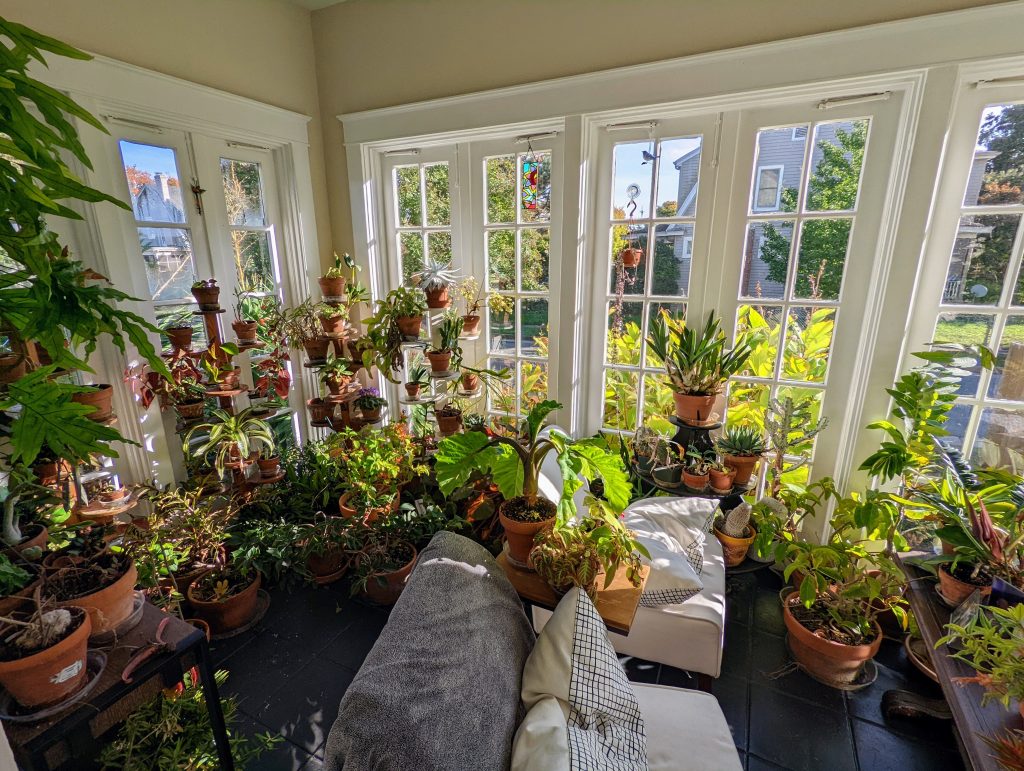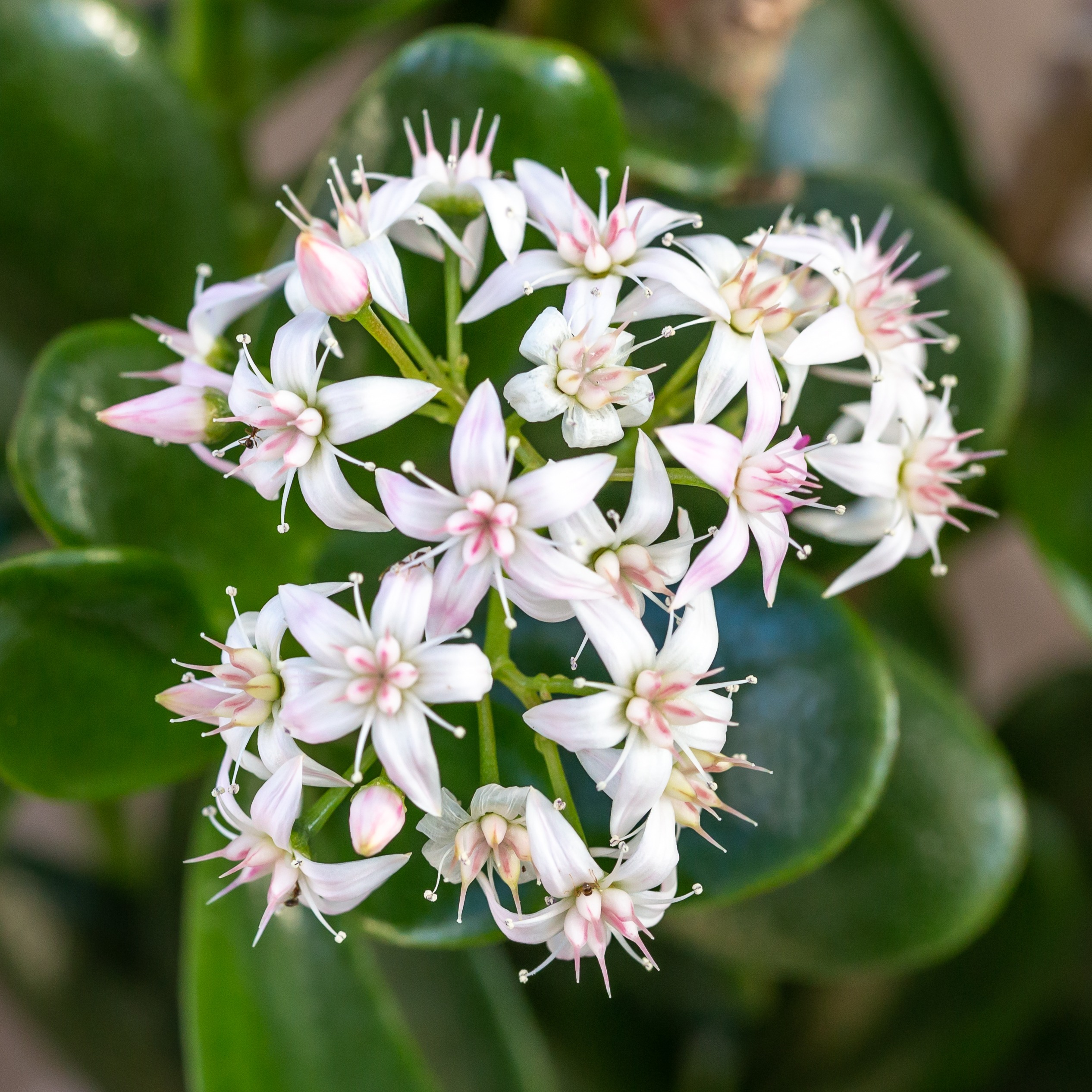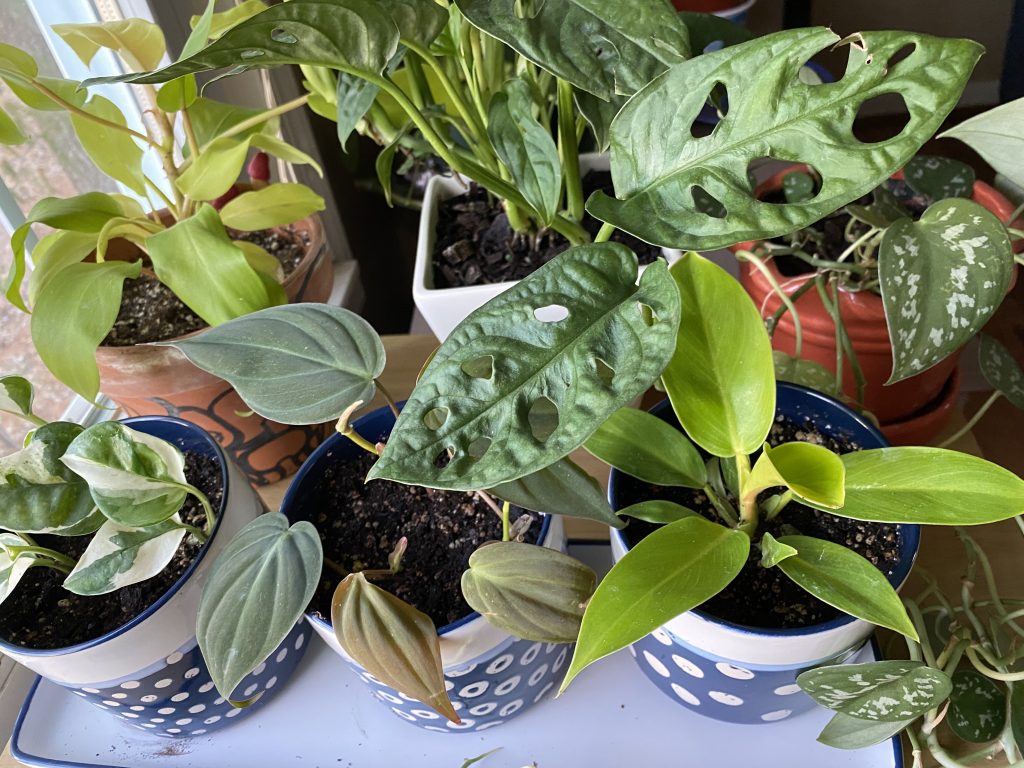Houseplants
Becoming a plant parent is trendy, fun and has numerous health advantages to boot. Caring for houseplants has been shown to reduce stress levels and have a soothing effect. They even improve air quality and boost productivity. But, if you’ve never cared for a plant before, it can be tough to know where to begin and what type of plant you should start with to be successful. Fortunately, Lewis Ginter Botanical Garden Senior Horticulturist Laurel Matthew has some tips so that even if you are brand new to indoor gardening you can start reaping these benefits and develop a green thumb.

Brian Trader, Lewis Ginter Botanical Garden’s President & CEO’s collection of houseplants. He is no beginner to being a plant parent!
Houseplant Tip #1: Evaluate your Space
“I recommend beginner gardeners choose houseplants that increase their confidence and set them up for success! Dead plants quickly put a damper on dreams of a lush and decadent indoor green space,” says Matthew. “So, before that first shopping trip, take an honest look at your dwelling – assess the light, temperature, humidity, space, windowsills, and furniture. Look for plants that are suited to thrive in your home environment — whether it’s a spacious sunroom or a small apartment window ledge.”
If you have pets in your home take that into consideration. We can recommend plants that are safe for cats, but also think about how to keep your plants safe from your pets. Do you travel often for work? Certainly, you’ll want to take that into consideration. Also, know yourself. How much time do you truly want to spend watering, grooming, and repotting your plants? It makes sense to start simple and if you enjoy it, work towards more complicated houseplants.
Houseplant Tip #2: Start Simple
What plants are low maintenance and great for beginners?

“A mature jade plant will even flower if triggered to do so by a gardener that knows to reduce its watering and expose it to a low-humidity environment and cooler temperatures,” Matthew says. Here’s one of ours blooming in the Conservatory at Lewis Ginter Botanical Garden. Image by Tom Hennessy.
“My favorite low-maintenance houseplant picks: snake plant, jade plant, pothos, and dracaena,” says Matthew.
“To me, the snake plant (genus Sansevieria), is the ultimate houseplant – it provides strong vertical visual interest without a lot of fuss and thrives in a wide range of light conditions, temperature fluctuations, and infrequent watering. Most gardeners have only seen one or two types of snake plant but there are many more, so it could be like a fun treasure hunt to build a diverse collection,” she says. Not to mention that you’ll impress your friends and visitors with your knowledge of them. If you focus on just one type of plant, like snake plant, you allow yourself the opportunity to become an expert on the care of that type of plant.
Jade plant is another low-care houseplant perfect for beginners. Jade plant (Crassula ovata) does need a bit more sun than snake plant, but like jade plant, it would rather be left unwatered than overwatered. “In the right conditions, jade plant will be a long-lived family favorite that gardeners can propagate and pass down through generations. A mature plant will even flower if triggered to do so by a gardener that knows to reduce its watering and expose it to a low-humidity environment and cooler temperatures.”
“Dracaena is definitely a rewarding houseplant – they are tough, low-maintenance, thrive in low or bright indirect light, and bring bold drama into the room,” says Matthew. “You’ll find a fabulous array of leaf color, pattern, shape, and size. These plants stay true to their nickname as dragon trees and will grow to be very tall members of the household. They’re slow-growing, but can eventually reach heights of five to ten feet tall or more; fortunately, they respond well to pruning and each of the pruned plant parts can be propagated easily.” Beautiful and useful too, dracaena are one of the most effective at purifying the air. However, if you have pets, beware: dragon plants are toxic to nibbling pets.
Pothos (genus Epipremnum), is another personal favorite,” Matthew says. “Unlike the snake plant, pothos can be quick-growing and horizontal growers that want to sprawl, climb, or hang. Their growth habit can provide lots of enjoyment and opportunities to train, lead, trellis, or propagate. Pothos leaves come in such a wonderful range of colors and patterns that gardeners will surely be tempted to collect them all. Pothos will prefer bright, indirect light so give them the window seat.”
Orchids are a surprisingly low-maintenance personal favorite of mine. You would never know from their tropically beautiful blooms that most orchids just need to be watered heavily once a week and be exposed to bright, indirect sunlight.
Houseplant Tip #3: Have Fun
“I hope these gardeners are embarking on a fulfilling and fun lifelong hobby,” says Matthew.
Gardening and owning houseplants opens up a whole new community to be part of. Especially in Richmond, with an abundance of plant shops waiting to be explored and members of the gardening community waiting to be met. We even sell houseplants plants in the Garden Shop! Dracaena($12.95) and jade plant($3.50) are among the houseplants for sale. Some of these local plant shops even have workshops for terrarium-building! A fun way to diversify your houseplants and interact with other plant lovers.
Did you know that Lewis Ginter Botanical Garden manages a Facebook page devoted to gardening questions? You can find other groups for buying and selling plants and even trading plants. You can also search our Garden Blog for gardening questions! Our blog posts offer gardening tips for both indoor and outdoor plants from our knowledgeable horticulturists to help you on your gardening journey.
“Don’t worry,” says Matthew. “The right plant for you is out there right now, sitting on a shelf in the store, patiently waiting for its forever home.”
